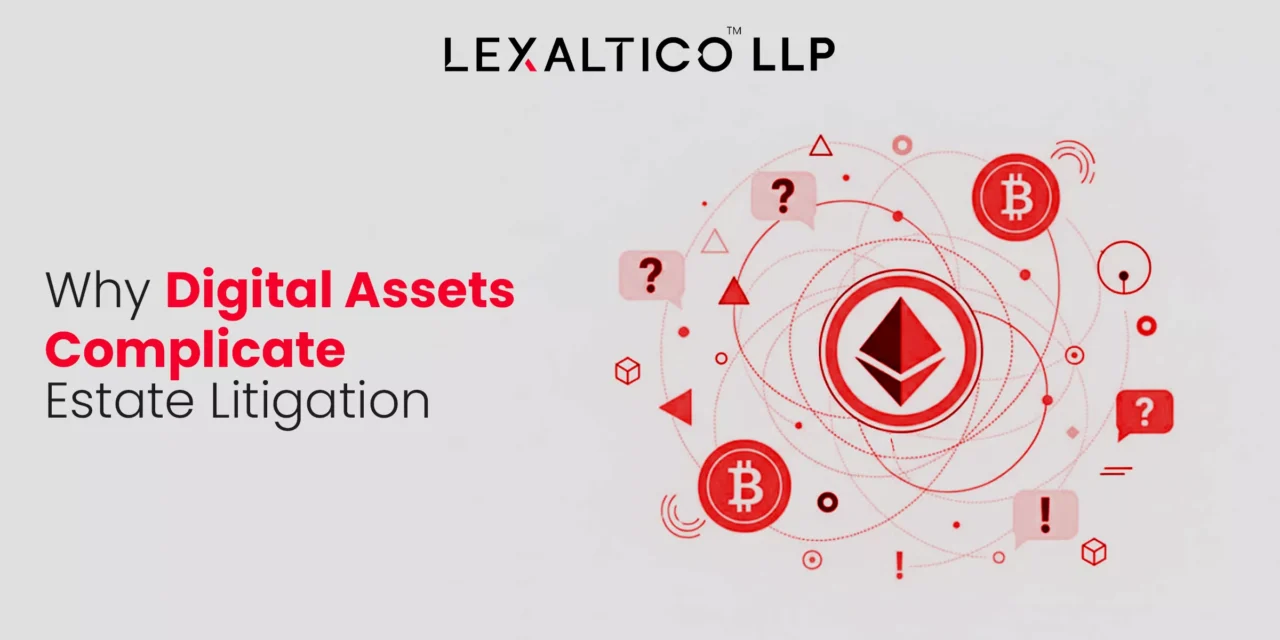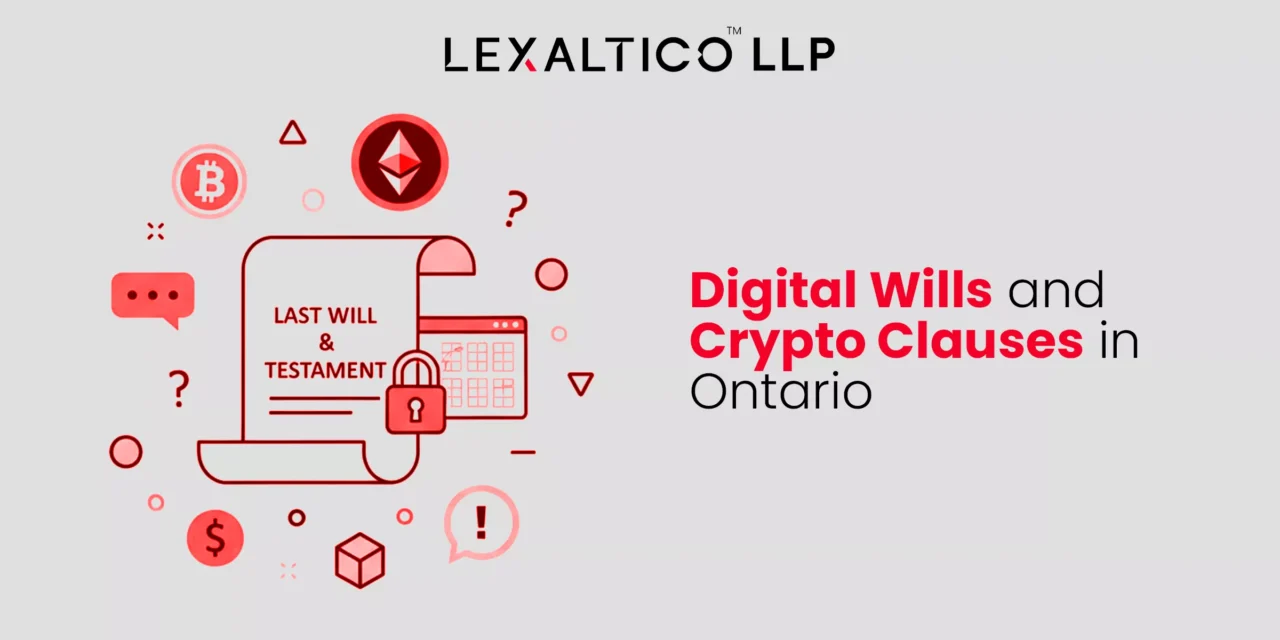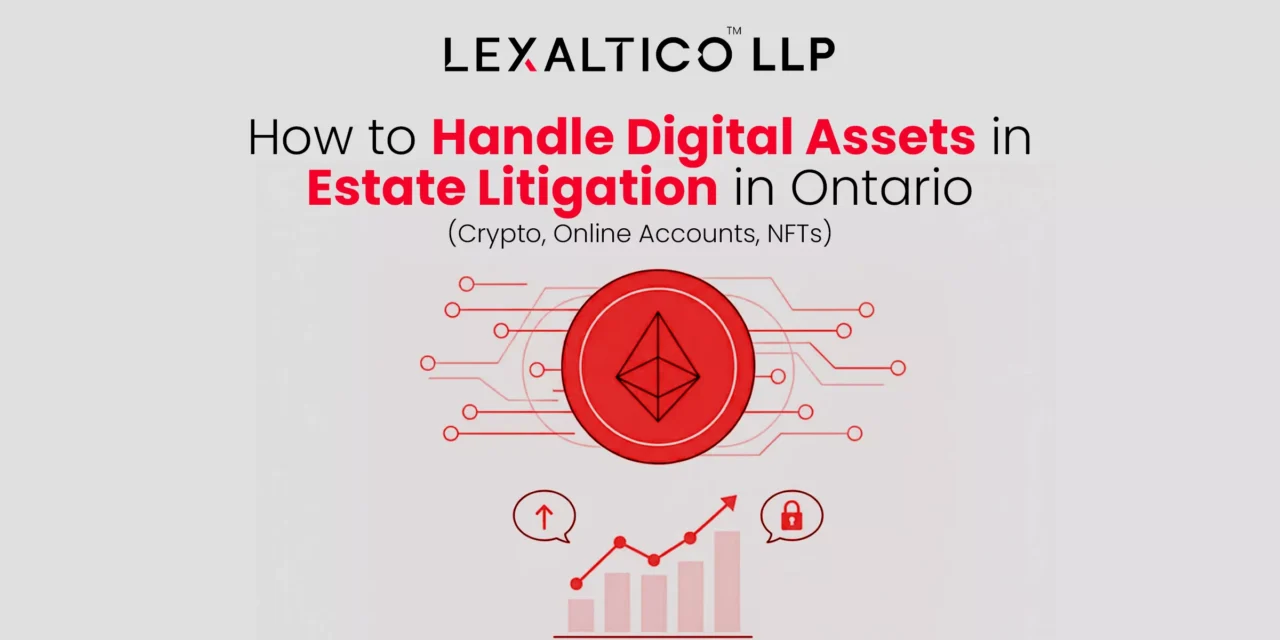Estate law in Ontario is evolving fast. The days when “estate assets” meant houses, jewelry, and bank accounts are gone. Today, executors and estate trustees must also grapple with digital assets, everything from Bitcoin and NFTs to email accounts and cloud drives.
But here’s the challenge: what happens when someone passes away without sharing passwords or wallet keys? Can an executor legally access their crypto wallet or Google account? How do courts handle digital assets in estate litigation?
Let’s unpack how to manage and litigate digital assets in estate disputes in Ontario, from crypto wallets and NFTs to Facebook and PayPal.
What Are Digital Assets in Estate Litigation?
Let’s face it, almost everything we own today lives partly online. From our PayPal accounts to crypto wallets, our “digital lives” are packed with value that doesn’t fit neatly into a filing cabinet. In estate law, digital assets refer to any electronically stored records or rights that hold financial or sentimental value.
In Ontario estate litigation, this category is surprisingly broad. It includes:
- Cryptocurrencies such as Bitcoin, Ethereum, or other blockchain-based tokens.
- Non-Fungible Tokens (NFTs) represent digital art, collectibles, or tokenized assets.
- Online accounts like Gmail, Dropbox, Facebook, or Instagram.
- Online financial assets, including PayPal balances, cryptocurrency exchanges, and digital-only banks.
- Digital intellectual property, from domain names and monetized YouTube channels to eBooks and online businesses.
Each of these assets carries real value, yet many are hidden behind passwords, encryption, or jurisdictional limits.
Ontario’s legal framework is still catching up with the digital revolution. While courts increasingly treat these assets as “property,” they occupy a gray zone between ownership rights and intangible data, raising tough questions during litigation.
Why Digital Assets Complicate Estate Litigation

When a person dies, their executor or estate trustee must find, secure, and distribute everything they owned. With traditional property that’s relatively simple. But when it comes to digital assets, the process gets messy.
Here’s why:
- No physical proof of ownership: Crypto and NFTs exist only in digital form. Without wallet keys or account access, proving ownership can be nearly impossible.
- Locked accounts: Many online services are protected by encryption or multi-factor authentication, which executors can’t bypass legally.
- Restrictive Terms of Service (TOS): Platforms like Google, Apple, and Facebook have policies that may prevent executors from accessing or even learning about a deceased person’s account contents.
- Cross-border complications: Some assets (like NFTs or crypto held on foreign exchanges) are governed by laws outside Ontario, leading to jurisdictional conflicts.
All these factors can trigger privacy disputes, delayed estate administration, and costly litigation. Executors often find themselves in legal battles just to gain access to digital records or assets that rightfully belong to the estate.
Ontario’s Legal Framework for Digital Estates
Ontario has no specific “Digital Assets Act” yet. Instead, lawyers rely on existing statutes:
- Succession Law Reform Act (SLRA) – governs wills and testator intent.
- Trustee Act – sets duties of executors and trustees.
- Personal Information Protection and Electronic Documents Act (PIPEDA) – governs privacy and data access.
- Electronic Commerce Act (ECA) – allows digital signatures and records.
While these laws weren’t written for crypto or NFTs, courts are adapting them to modern realities.
Classifying Digital Assets as Property
When someone passes away in Ontario, one of the first questions an executor faces is: what exactly counts as property? In the age of Bitcoin, NFTs, and cloud accounts, that’s no longer a simple question.
Traditionally, property meant something you could touch or legally own, like a car, house, or jewelry. But digital assets blur those lines. Are cryptocurrencies and NFTs “property” under Ontario estate law, or are they merely lines of code floating on a blockchain?
The answer, increasingly, is yes, digital assets can be classified as property.
Digital Wills and Crypto Clauses

A growing trend is adding a digital assets clause in wills. These clauses authorize executors to:
- Access and manage all online accounts.
- Retrieve and store encryption keys or passwords.
- Distribute digital property according to the will.
Including a crypto clause (e.g., specifying cold wallet instructions) can prevent massive losses of digital wealth.
Role of the Digital Executor
Many testators now appoint a “digital executor”, a trusted person tasked specifically with handling online assets.
This role may exist alongside or separate from the main estate trustee.
Their responsibilities include:
- Locating and securing all digital accounts.
- Managing passwords, keys, and storage devices.
- Coordinating with digital platforms for access.
- Ensuring compliance with privacy laws.
This role bridges the gap between technology and traditional fiduciary duty.
Accessing Online Accounts After Death
Here’s where it gets tricky. Even with a will, executors can face resistance from service providers.
Platforms like Facebook and Google require proof of death and court authority before granting limited access, and even then, only to certain data.
- Facebook allows memorialization or deletion through a legacy contact.
- Google offers an Inactive Account Manager feature for data transfer.
- Apple now supports a Digital Legacy program.
Without these pre-authorizations, executors might need a court order to compel access, a process that can take months.
Crypto and NFTs in Ontario Estate Litigation
Cryptocurrency and NFTs pose special challenges:
- Valuation volatility: Bitcoin value can change daily.
- Ownership verification: Private keys are proof of control.
- Asset tracing: Blockchain forensics may be required.
- Chain of title: Courts must determine who owns the asset if accounts are shared or keys lost.
Law firms emphasize that proper documentation, wallet records, exchange accounts, and private key storage is essential to avoid loss or fraud during estate distribution.
Digital Forensics and Asset Tracing
In disputed estates, digital forensics experts are often called in to recover or trace hidden assets.
These experts use blockchain analytics and metadata tracing to locate crypto transactions, even on anonymous wallets.
Courts may order asset tracing to determine whether digital holdings were transferred before or after death, a key issue in fraud and undue influence claims.
Privacy Law and Access Challenges
Privacy law is one of the most complex barriers. Under PIPEDA, personal data cannot be disclosed without consent, even after death.
However, PIPEDA allows limited access when necessary for estate administration, but data may remain protected for up to 20 years after death.
That means executors must navigate privacy rules carefully, balancing data recovery with legal compliance.
Cross-Border and Jurisdictional Issues
What if a deceased person held crypto on an exchange based outside Ontario say, Binance or Coinbase? This creates a jurisdictional conflict: the platform’s laws may differ from Ontario’s estate law.
Courts must decide which jurisdiction’s rules govern access, ownership, and taxation. Cross-border estate disputes involving NFTs or crypto can become lengthy and expensive.
Intellectual Property and Tokenization Issues
Digital assets often have intellectual property (IP) components, like copyrighted photos or music embedded in NFTs.
In estate disputes, IP rights may survive the testator’s death but require legal transfer.
Similarly, tokenized real-world assets (like digital deeds or art) complicate inheritance because ownership depends on both blockchain and traditional property law.
Best Practices for Testators and Executors
Estate disputes over digital assets can turn into digital disasters if you’re not prepared. Whether you’re a testator (the person making the will) or an executor (the one carrying it out), proactive planning is your best defense against confusion, lost assets, or litigation.
Here’s a simple roadmap to keep your digital assets estate administration in order:
1. Create a Digital Asset Inventory
Start by listing every digital footprint that has value both financial and personal.
That means crypto wallets, PayPal accounts, domain names, Dropbox files, and even social media profiles. Include access credentials where possible, or note where keys are stored.
A comprehensive digital asset inventory helps your executor know exactly what exists and where to find it, saving time, money, and frustration later.
2. Use Secure Storage
Your digital estate plan is only as strong as your security. Store your sensitive credentials especially private keys, encryption passwords, and cold wallet codes in secure, encrypted vaults or password managers.
Consider tools like 1Password, Bitwarden, or hardware-based cold wallets for crypto. Avoid storing passwords in plain text or unprotected documents, which could expose them to theft or loss.
3. Include a Digital Assets Clause in Your Will
A digital clause gives your executor legal authority to access and manage your online accounts. Without it, they might hit privacy barriers or Terms of Service roadblocks.
This clause should clearly state your wishes regarding:
- Access to social media, email, and financial accounts
- Handling or liquidation of cryptocurrencies and NFTs
- Data deletion or memorialization preferences
4. Appoint a Digital Executor
Not every executor understands crypto wallets or cloud encryption, and that’s okay. You can appoint a digital executor specifically for this role.
This person should be tech-savvy, trustworthy, and willing to work alongside your main executor. Their job?
To manage and secure your digital holdings, from NFTs to online businesses, and ensure they’re distributed according to your will.
In complex cases, courts increasingly recognize the digital executor role in estate litigation to prevent disputes or loss of assets.
5. Review and Update Regularly
Technology changes fast, and so should your plan. Review your digital estate inventory at least once a year, or whenever you create new accounts or investments.
Update your passwords, remove obsolete accounts, and verify that your executor still has the tools and knowledge to access your digital estate.
Keeping your plan current ensures your loved ones won’t be locked out of your digital legacy.
Litigation Risks and Case Studies
When executors fail to secure or distribute digital assets properly, litigation can arise.
Common scenarios include:
- Family members disputing ownership of crypto accounts.
- Executors accused of mismanaging or losing NFTs.
- Hidden online assets discovered after probate.
In these cases, courts may appoint special estate trustees during litigation to trace and manage disputed digital property.
Conclusion: The Digital Legacy Is Real
Digital assets are no longer fringe; they’re part of everyday estates in Ontario. From crypto wallets to YouTube royalties, they carry real financial and emotional value. Handling them in estate litigation requires legal foresight, technical expertise, and privacy compliance.
If you’re drafting a will, add a digital clause. If you’re an executor, consult a lawyer experienced in digital estate law. And if you’re in a dispute, act fast, because lost keys mean lost assets, permanently.
Quick FAQs
Any online account or electronic record with value including crypto, NFTs, and social media profiles is considered a digital asset.
You can add them under a “digital assets” clause, specifying wallets, exchanges, and access instructions.
TOS agreements (like those from Google or Apple) may restrict access. Executors often need legal authority or court orders to gain entry.
PIPEDA restricts disclosure of personal data but allows access when necessary for estate administration for up to 20 years post-death.
Cross-border jurisdictions complicate ownership and taxation, often requiring international legal cooperation.
Consult a digital forensics expert or lawyer. Never guess or hack access courts may help obtain lawful authority.
Yes, if your estate includes extensive digital holdings or crypto wallets.
At least once a year, or whenever you create or delete significant online accounts.
Absolutely. Digital assets can be frozen, traced, or divided like traditional property in court.
Valuation is usually determined based on the market value at the date of death, verified by blockchain or exchange records.
Disclaimer: The information provided in this blog is for general informational purposes only. It is not legal advice and should not be relied on as such.



